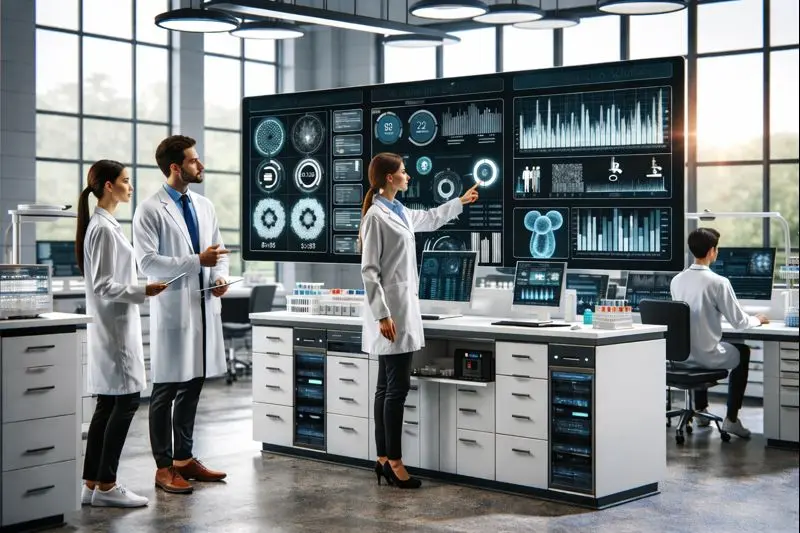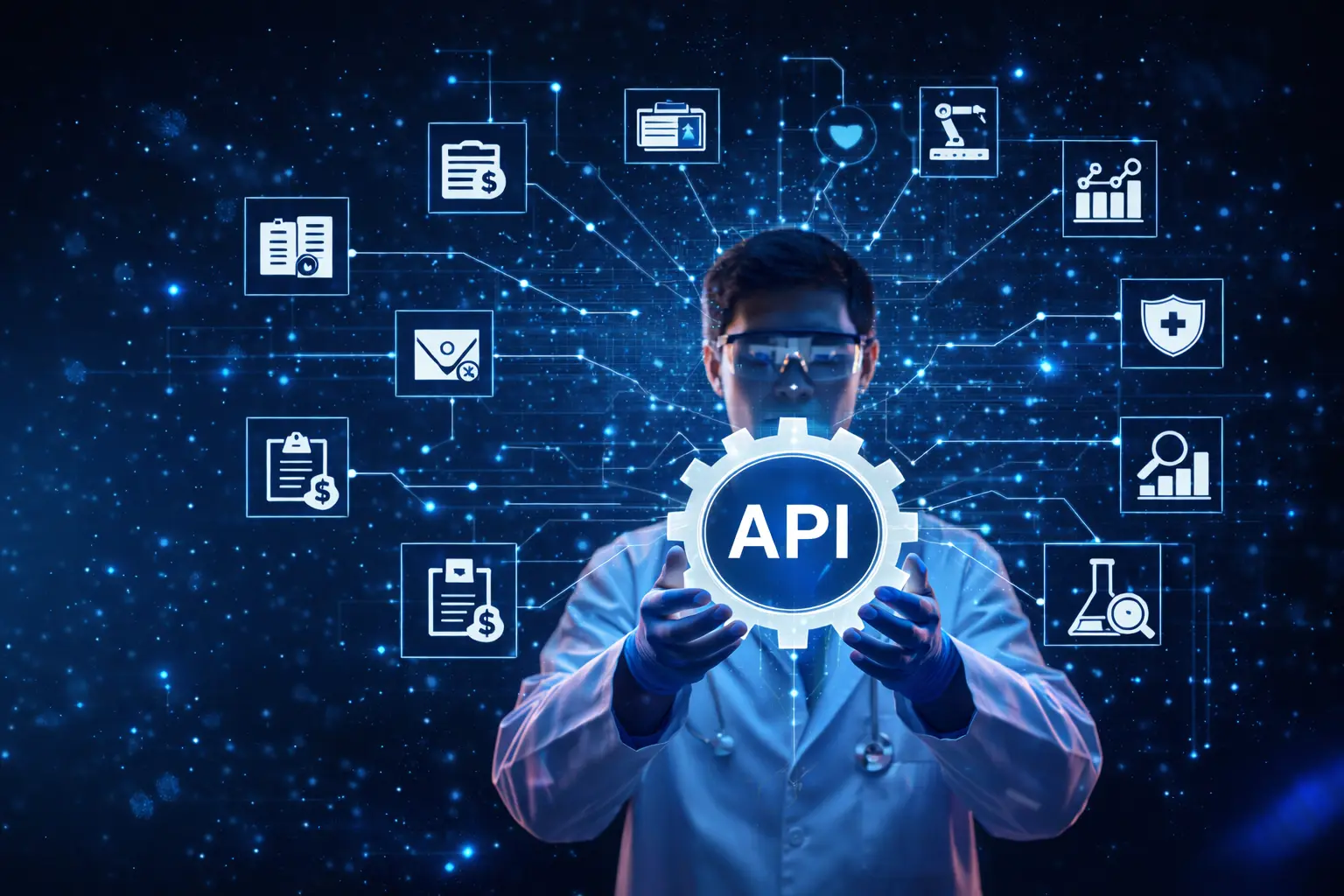Blog
How AI Can Propel Medical Laboratories into a New Era of Growth
February 12, 2026
What was predicted for years has now come true. The age of artificial intelligence (AI) has arrived.
Artificial intelligence is already transforming industries across the globe, including healthcare, and the potential for what comes next is virtually limitless. What once felt futuristic is now actively reshaping how organizations operate, innovate, and deliver value.
Before diving into how AI can specifically accelerate progress for clinical laboratories and pathology groups, let’s first take a broader look at how AI advancements are enhancing everyday life, redefining workflows, and unlocking new possibilities across nearly every sector.
Discover More: Emerging Technologies of the Future Lab - A Webinar Recap

Defining AI and Various Applications
Artificial intelligence refers to the use of computer systems to perform tasks that traditionally required human intelligence, such as learning, reasoning, pattern recognition, and problem-solving. What once depended entirely on human judgment can now be executed, and often optimized, by advanced algorithms operating independently.
Today’s AI systems don’t just mimic human thinking; they can augment and, in some cases, surpass human cognitive capabilities for specific tasks. By processing vast amounts of data at remarkable speed, AI delivers outcomes with a level of efficiency, consistency, and accuracy that would be difficult for humans to achieve alone.
Core Branches of Artificial Intelligence
AI is not a single technology but a collection of approaches and methodologies. Key subsets include:
Symbolic or Rule-Based AI
This traditional approach encodes human knowledge into structured rules and symbols. The system follows predefined logic to make decisions and draw conclusions. While less adaptive than modern AI methods, rule-based systems remain useful in highly structured environments.
Machine Learning (ML)
Machine learning is a subset of AI focused on building algorithms that learn from data. Rather than relying solely on predefined rules, ML models analyze patterns in historical data to make predictions or decisions. Over time, as they are exposed to more data, their performance improves, often dramatically.
Deep Learning
Deep learning is a specialized branch of machine learning that uses artificial neural networks modeled loosely after the human brain. These multi-layered networks can recognize complex patterns and relationships in massive datasets. Deep learning has driven breakthroughs in image and speech recognition, and natural language processing.
AI in Action Across Industries
AI’s versatility has enabled widespread adoption across diverse sectors:
Finance
AI analyzes enormous volumes of financial data to forecast market trends, detect fraud, and identify investment opportunities. Financial institutions also deploy AI-powered chatbots and virtual assistants to enhance customer service and deliver personalized guidance.
Process Improvement and Manufacturing
AI supports predictive maintenance, quality assurance, and supply chain optimization. Intelligent robotics and collaborative robots (cobots) automate repetitive tasks while working safely alongside human employees, boosting productivity and operational efficiency.
Education
AI powers personalized learning platforms and adaptive virtual classrooms. By analyzing student performance data, AI systems deliver customized recommendations and feedback, allowing learners to progress at their own pace. Emerging technologies like virtual reality (VR) and augmented reality (AR) further enhance engagement and experiential learning.
Entertainment
Streaming platforms use AI-driven recommendation engines to analyze viewing habits and preferences, delivering personalized content suggestions. AI also plays a role in content creation, from music composition to script development.
Across industries, AI is redefining how organizations operate, transforming raw data into actionable intelligence and opening the door to new levels of innovation and performance.
Industry Insights: The AI Revolution in Laboratory Billing - A Game Changer for 2026 and Beyond
Applying AI in Tandem with the Best Laboratory Information System Software
Now let’s focus on how AI applied within a clinical laboratory or pathology practice can drive both innovation and scalability by working in tandem with a modern medical laboratory information system (LIS software) to improve lab workflow processes, disease detection, and most importantly, personalized patient care and better patient outcomes.
Here are examples that highlight how the introduction of AI technology into pathology or clinical lab workflow can make a huge operational difference.
Automated Data Entry
AI-powered optical character recognition (OCR) can automatically extract data from handwritten or printed laboratory requisitions, test orders, and patient records. By feeding this information directly into the laboratory information system software, AI significantly reduces the need for manual data entry by LIS lab personnel. The result is fewer transcription errors, lower administrative costs, and faster turnaround times (TAT) for laboratory orders.
Workflow and Process Optimization
AI algorithms can analyze laboratory workflows and specimen processing protocols to uncover bottlenecks and inefficiencies. By identifying repetitive manual tasks that can be automated within the LIS system software, AI helps streamline operations, reduce labor expenses, and improve productivity. Additionally, AI can integrate and analyze data from multiple sources, delivering a comprehensive operational view and revealing correlations that might otherwise remain hidden in siloed systems.
Workload Prioritization
LIS systems enhanced with AI can intelligently prioritize laboratory workloads by evaluating incoming test volumes, patient demographics, case urgency, and historical patterns. By flagging critical samples and high-priority cases, AI ensures that urgent tests are processed and reported promptly while optimizing overall resource allocation.
Diagnostic Accuracy
Deep learning models trained on extensive datasets can detect subtle patterns that the human eye may not recognize. In pathology, for example, AI can assist in identifying abnormalities in histopathology slides, supporting earlier detection and more precise diagnoses. Rather than replacing expertise, AI augments clinical insight with data-driven reinforcement.
Predictive Analytics
When integrated with a modern lab information system, AI can analyze historical testing data, utilization trends, and patient outcomes to forecast future demand and performance. This includes predicting patient responses to treatments based on genetic markers, as well as anticipating test volumes and associated resource requirements. With these insights, laboratory leadership can optimize staffing, inventory, and instrument utilization more strategically.
Quality Control and Anomaly Detection
AI-driven anomaly detection tools continuously monitor laboratory data within the LIS software, such as test results, instrument performance, and quality control metrics, to identify deviations from established norms. By flagging irregularities in real time, AI enables laboratory teams to investigate potential issues quickly, safeguarding accuracy, compliance, and reliability.
Clinical Decision Support
AI-powered decision support systems leverage real-time analytics to assist laboratory professionals, physicians, and patients in interpreting complex test results. By analyzing large datasets, aligning findings with clinical guidelines, and detecting emerging trends, these lab test interpretation tools enhance diagnostic clarity and support more informed treatment decisions.
Continuous Learning and Improvement
Through machine learning, AI systems evolve. As new data flows into the LIS system, algorithms refine themselves, improving performance, accuracy, and operational efficiency. This adaptive capability ensures that laboratory operations become progressively smarter and more responsive.
Training and Education
AI-enabled simulations and virtual laboratory environments provide dynamic training experiences for laboratory personnel. These tools allow staff to stay current with evolving lab workflow, compliance requirements, and best practices. This supports continuous professional development while maintaining operational excellence.
Get Insight: The Best Laboratory Information System Vendors and the Advantages They Offer to Their Laboratory Clients

How LigoLab is Integrating AI into its Informatics Platform
For nearly two decades, LigoLab has made a name for itself among laboratory information system vendors by leading the way in LIS system software innovation. Knowing this, it’s no surprise that the LIS company already has plans in place to leverage AI functionality that will benefit its clinical and pathology software client base.
Here are two examples of what LigoLab customers can look forward to, thanks to AI-LIS system integration.
Natural Language Processing (NLP) for Intelligent Coding
AI-driven natural language processing (NLP) capabilities within the LigoLab Informatics Platform will be designed to interpret and understand human language in clinical documentation. By analyzing medical records, pathology reports, and related data, the LIS system platform can accurately extract relevant details and assign appropriate ICD and CPT codes.
Automating ICD and CPT coding through AI enhances both accuracy and efficiency in this critical laboratory workflow. By minimizing errors and inconsistencies while accelerating TAT, AI-powered coding strengthens laboratory revenue cycle management (lab RCM) and compliance. At the same time, automation frees pathologists and coding professionals to focus on higher-value analytical and clinical responsibilities rather than manual administrative tasks.
Recommendations and Personalized Reporting
Building on predictive analytics, AI algorithms embedded within the LigoLab platform can analyze historical laboratory data alongside patient-specific factors such as demographics, medical history, and genetic information. This enables the identification of potential health risks, supports proactive disease management, and delivers more actionable clinical insights.
By incorporating individual risk profiles and patient characteristics, LigoLab can assist providers with AI-informed recommendations while also empowering laboratory teams to generate personalized laboratory reports. These reports can be tailored to improve clarity and relevance, presenting results in easy-to-understand formats, offering contextual explanations, and highlighting meaningful trends over time.
This level of personalization not only enhances clinical decision-making but also improves patient engagement and understanding, reinforcing the laboratory’s role as a strategic partner in patient care.
Discover More: Why Laboratory Leaders Are Re‑Thinking Their LIS System Strategy in 2026 - and Where LigoLab Fits
Make Sure Your Medical Laboratory is Ready for the Age of AI
Artificial intelligence is rapidly redefining what’s possible for medical laboratories seeking sustainable, exponential growth. As AI capabilities advance and computing power expands, the connection between AI and laboratory operations will only deepen, transforming workflows, decision-making, and financial performance.
Clinical laboratories and pathology groups that embrace AI alongside the best laboratory information system software will gain measurable advantages in efficiency, accuracy, scalability, and strategic insight. More importantly, they’ll position themselves as innovation leaders in an increasingly competitive and data-driven healthcare landscape.
The future belongs to laboratories that modernize with intention.
Ready to see what an AI-enabled, future-ready laboratory information system platform can do for your organization?
Explore LigoLab’s approach to pathology and clinical laboratory management and discover how partnering with a forward-thinking LIS company can accelerate performance, protect margins, and unlock new growth opportunities.






